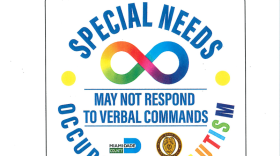-
The optional program has been passed in several states over the last few years. Supporters say it will help drivers with autism and law enforcement officers communicate better. Critics worry it'll be used to create a statewide autism registry.
-
For years, Tylenol has generally been considered safe for treating pain and fever — even during pregnancy, when doctors discourage patients from using many medications. But recent news reports about the federal government connecting Tylenol to autism have drawn fresh questions about the drug, and concerns. PolitiFact and WLRN analyze the reports, and tell you what else you should know.
-
The chatter, the crowds, the unexpected — air travel can feel like a minefield for kids with autism. But a new "practice flight" may help ease that anxiety.
-
The new law will fill in the gaps in learning opportunities by offering an extra year of Early Steps and a specialized summer program
-
In Florida, drowning is the leading cause of accidental death for children ages one through four. And for children with autism, the risk is even greater. To help families protect their children, experts have released a new water safety guide tailored specifically for children with autism.
-
The measure would designate the University of Florida's Center for Autism and Neurodevelopment as the state hub for research, services and best practices
-
Preparation and flexibility are essential strategies when navigating the holiday season with children with autism, Brittney Rick-Betancourt, the director of Little Leaves Behavioral Services in Weston, tells WLRN.
-
The report finds 109 children with autism drowned in Florida between January 2012 and April 2024.
-
A new program aims to save lives by alerting police in Miami-Dade County that an occupant within a home or a vehicle has autism.
-
Roberto Carlos Cruz Garcia is the author behind "Sweet Boy: The Unintentional Offender." Roberto has ADHD and he’s on the Autism spectrum. But as a kid, he was undiagnosed — and this made him the sweet boy who would sometimes say the wrong thing at the wrong time and that became the inspiration for the book.
-
The city staff underwent almost two years of training to make the city more accessible to those with autism.
-
As the summer heats up in Florida, an expert warns families who have children with autism to pay close attention. Drowning is the leading cause of death for autistic kids.
Play Live Radio
Next Up:
0:00
0:00
Available On Air Stations










